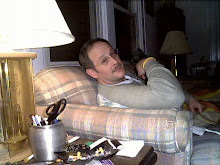If there is anything about which the bulk of humanity can agree, it is the proposition that there is something intrinsically wrong with the nature of man. A survey of ancient literature shows a trend among the ancients to place the blame on the caprice and folly of the gods. They wanted to shift the responsibility onto beings who operated beyond their ken, into a realm beyond their control.
Likewise the moderns, that is the secularists, atheists and relativists, want to shift blame for our broken nature into an equally inaccessible and irreparable material realm. They wish to blame it on "the selfish gene" to borrow a phrase from the great materialist cheerleader Richard Dawkins. They contend that man's basic flaws are contained in the genetic code which drives the organism to act solely out of a desire to preserve its genes in the pool of the species. Although most of those of the materialist mindset deny the existence of our free will, there are some who adhere to this "selfish gene" idea, Dawkins included, who contend that we, as a species, have outgrown the need to follow this basic genetic drive, contending in the process that we should "be good for goodness sake". The methodology by which we are to attain this goodness is left undefined.
There is, however, a middle road. It is, in the words of St Paul, "a more excellent way". It is the way of Christianity. Like all roads to recovery, this route requires that we place the blame squarely where it belongs, not on the capriciousness of inaccessible and petty deities, not on the equally mystical and inaccessible gene, but squarely on the shoulders of man himself.
Further, this middle road proposes a solution to our tendency towards sin, our concupiscence. It is not a one shot solution, it is an ongoing solution, a continuous process, a way of life. As our brokenness came through the will of man, so does our salvation, the realization of what we were intended to be flow from the willing assent of man to conform to the will of our Creator who defined our original nature. Christianity holds us to a higher standard, we are held accountable to a higher authority, our God. We are told that after acknowledging that the fault for our broken nature is our own, we must confess our transgressions, we must make amends to those we have harmed, we must live in the service of that higher authority and our fellow men.
Why is this God necessary? This is the great question the secular humanist asks. Humans do not conform to rules without some method of enforcement and punishment. Just as secular laws require provisions for enforcement and retribution against transgressors, so must the natural law hold these threats.
As Chesterton once observed "Christianity has not been tried and found wanting. It has been found difficult and left untried." Man alone cannot reform himself. The reform of man can only come through the realization that the rift between him and his Maker has been healed, and that by adhering to the will of that Creator we will be able to "put away those childish things" and grow into the beings we are meant to be.
Til next time, all the best. Joe
My new blog: The Radical Life
12 years ago

No comments:
Post a Comment